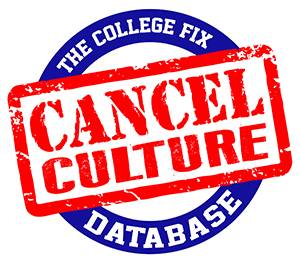
What is The College Fix’s Campus Cancel Culture Database?
The database serves as a one-stop shop to monitor, chronicle — and remember — the effect of cancel culture on higher education. It seeks to document every example of targeting and suppression in an age of censorship, memory-holing, and soft totalitarianism.
How does the database define cancel culture?
We define cancel culture as any effort by people or groups to identify someone or something as offensive or unacceptable and seek in some way to censor or punish the transgressor or item.
How many entries are in the database?
Upon initial publication in September 2021, the database contains more than 1,400 entries spanning from about 2013 to 2021. This number will increase as editors of The College Fix continue to monitor the problem and readers submit entries for suggested additions from the past and present.
Why include protested items? Why not include only canceled ones?
The idea is to create a database that tracks and quantifies the massive scope of cancel culture in higher education, including both its successful cancelations as well as its unsuccessful ones, which can still have a chilling effect on freedom of thought. The database’s wide lens helps reveal the strength and diversity of cancel culture.
How do I view only targets that have been canceled?
The database can be searched in three main ways: to show only protested items, to show only canceled items, or to show both. Use the search parameter tools atop the database to find focused search results. The database also supports keyword searches. Readers may also search the database by target, for example only statues, paintings, student groups, professor comments, etc.
To view only canceled items, click here.
Does the database include multiple entries for items both protested and canceled?
No. The database aims to include only one entry per item targeted. For example, the Silent Sam Confederate statue at UNC Chapel Hill was protested for many years before it was finally shuttered. But the database only includes one Silent Sam entry.
Does the database include items targeted by the Left as well as the Right?
Yes.
Isn’t it a constitutionally protected and time-honored tradition to protest things in America? How is that cancel culture?
The average protest is not an example of cancel culture and we strive to keep typical campus protests out of this database. The examples of “protests” we include in the database will involve some sort of demand for censorship, cancelation, terminations/firings, malicious vandalization or destruction of property, or other various restrictions or punitive actions. Details for each entry are available in the corresponding link. Readers can decide for themselves if any cancelations are justifiable.
How do I suggest an addition to the Campus Cancel Culture Database?
Fill out this online form. College Fix editors will review your submission. After vetting and approval, it will be added to the database.
Does the database include examples of K-12 cancel culture?
No, K-12 is not included in the database. Suggestions for K-12 will not be added. This database is meant to cover higher education, mostly in the United States but also with examples from Canada, the U.K., and Australia as well.
What sources does the database use?
Most are news articles from The College Fix and other major news outlets. Each entry includes a URL link to more information.
I know of a cancel culture incident not listed on the database. What should I do?
Fill out this form. The submission will be reviewed by College Fix editors then added if approved.
There’s an item on the database I don’t think falls under the cancel culture umbrella. What should I do?
Contact the editors. We will consider the suggestion and respond as warranted.
How do I submit a correction suggestion to the database?
Contact the editors. We will consider the suggestion and respond as warranted.




Please join the conversation about our stories on Facebook, Twitter, Instagram, Reddit, MeWe, Rumble, Gab, Minds and Gettr.